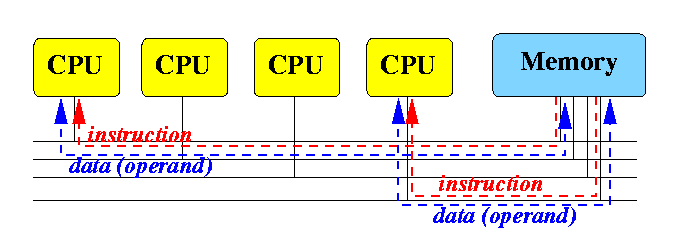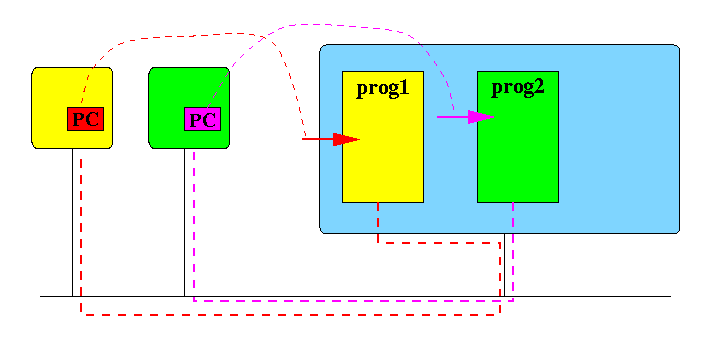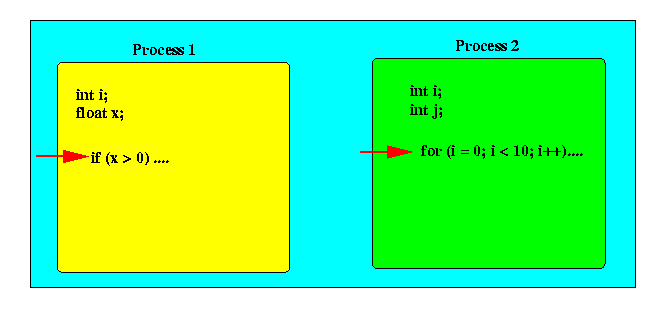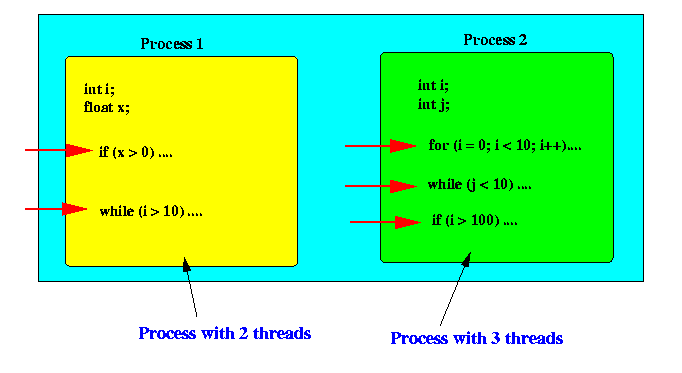- Recall that a
Shared Memory
multi-processor has the following
(simplified) architecture:

(NOTE: the inter-connection network is irrelevant to the programming and has been omitted).
- The memory is shared by all CPUs
- Each CPU fetches its own instruction and executes it
- A process (in any operating system, e.g. UNIX)
is
created whenever a program is run
- Property
- Processes
do not share memory space
Consequently: Different process cannot modify each other's variables stored in memory
- This property is
enforced
by the
Operating System (e.g., UNIX)
The reason for this is safety and reliability:
- How do you feel if your program crashes because a bug in someone else's program updated one of the variables in your program ???
- Processes
do not share memory space
- Different processes can be
executed simultaneously
in a
multi-processor computer
(computer with multiple CPUs)
Example:

Definition:
-
A thread of execution
(or
thread for short) is
a
location in the program
where a processor (CPU) is
fetching and executing instructions
In other words: a thread makes progress in executing a program
Conclusion:
- In the example above, each process
has
a single thread of execution
- In the figure, the instructions at the arrow in both processes
may be executed simultaneously
- But within one process , there is only one thread of execution
- In the example above, each process
has
a single thread of execution
- Each process has at least one thread of execution.
- Most (if not all) programs that you have seen probably have
ONE SINGLE thread of execution
These are called SINGLE threaded programs
We will soon see MULTI threaded programs

|
- Different processes do not share
instruction (program) code
- Different processes do not share
variables
- Different processes may
share a minimum amount
of variables that
allow them to
communicate
with each other through
the operating system kernel using a
system call
(i.e., with the aid of the Operating System)
- E.g., Parent and Child UNIX processes share file descriptors which allow them to create "pipes" to communicate with each other.
|
|
- Another look at a thread :
- A thread can be thought as a flow of control or line of execution inside a process
There is at least one thread within every process (otherwise, the process will not run :-))
- "Traditional" processes are
single threaded
A single threaded process has exactly one thread...
- A
multi-threaded program has
more than one thread
- A multi-threaded program has multiple flows of control
- Example:

- If
the computer is a
multi-processor
(multiple CPUs),
the computer can
simultaneously execute
instructions
at multiple places
inside the same program !!!
- In the above picture, the computer is
executing
two instructions
from process 1
and
three instructions
from process 2
simultaneously
(This is assuming we have at least 5 CPUs !!!)
- Just to get you exicted on writting multi-threaded programs
(later, I'll get you acquainted with the
caveats
of parallel program execution),
here is a very simple example of a multi-threaded program
- Example Multi-threaded program:
#include <pthread.h> pthread_t tid[100]; // Each thread executes the following function: void *worker(void *arg) { int i; i = pthread_self(); cout << "Hello, I am thread # " << i << endl; return(NULL); /* Thread exits (dies) */ } /* ======================= MAIN ======================= */ int main(int argc, char *argv[]) { int i, num_threads; num_threads = atoi(argv[1]); /* ------ Create threads ------ */ for (i = 0; i < num_threads; i = i + 1) { if ( pthread_create(&tid[i], NULL, worker, NULL) ) { cout << "Cannot create thread" << endl; exit(1); } } // Wait for all threads to terminate for (i = 0; i < num_threads; i = i + 1) pthread_join(tid[i], NULL); exit(0); }
- The above program makes use of two
functions from the
PThreads API
-
pthread_create(&tid[i], NULL,
worker, NULL)
will:
- Create a
new thread of execution
(new beginning of execution)
- The new thread
executes the function
worker()
- Each thread has a unique
thread ID
The thread ID of the new thread will be returned in the variable tid[i] (the first parameter of the function call)
Notice the address of tid[i] is passed, so the pthread_create(&tid[i], NULL, worker, NULL) can update the variable !
- Create a
new thread of execution
(new beginning of execution)
-
pthread_join(tid[i], NULL, worker, NULL)
will:
- pause the
thread that invoked the function
until the thread
tid[i]
terminates
- A thread is terminated when the function worker() returns
- pause the
thread that invoked the function
until the thread
tid[i]
terminates
-
pthread_create(&tid[i], NULL,
worker, NULL)
will:
- Example Program:
(Demo above code)

- Prog file: click here
Compile with: CC -mt thread01.C
Run the program several times and you will notice that the threads prints things out in different order...
We do not have control on when each thread is run....
- Computers execute
assembler instructions,
not
high level language statements, such as "i = i + 1".
- A
high level language statements, such as "i = i + 1".
results in
a sequence of assembler instructions
- Example:
High level programming language: i = i + 1; (Assuming variable i is stored at address 2000) Assembler code: 1. read value from memory address 2000 into the CPU 2. add 1 to this value 3. write value from CPU to memory address 2000This detail will be important when we have multiple threads executing in a program.
- Example: Asynchronous update of a variable
#include <pthread.h> int N; pthread_t tid[100]; // Each thread executes the following function: void *worker(void *arg) { int i, k, s; for (i = 0; i < 10000; i = i + 1) { N = N + 1; } cout << "Added 10000 to N" << endl; return(NULL); /* Thread exits (dies) */ } /* ======================= MAIN ======================= */ int main(int argc, char *argv[]) { int i, num_threads; num_threads = atoi(argv[1]); /* ------ Create threads ------ */ for (i = 0; i < num_threads; i = i + 1) { if ( pthread_create(&tid[i], NULL, worker, NULL) ) { cout << "Cannot create thread" << endl; exit(1); } } N = 0; // Wait for all threads to terminate for (i = 0; i < num_threads; i = i + 1) pthread_join(tid[i], NULL); cout << "N = " << N << endl << endl; exit(0); } -
Example Program:
(Caveat of multi-threaded programs) ---
click here

- Compile with: CC -mt thread02.C
- Run to see some interesting results....
- Compile with: CC -mt thread02.C
- The effect is explained below....
- Threads are flows of control within the SAME program
- As such, all threads share the same memory space !!!
- All threads in a program
share
the
global variables
in the program
- Threads do not share their local variables (unless a thread has convey the address of their local variable to another threads)
- All threads in a program
share
the
global variables
in the program
- Threads can be in one of 2 states
- ready to run
- blocked (but we have not learned how to block a thread yet)
Threads that are ready to run will be executed in an order determined by the thread scheduling system
(The programmer does not (nor should ) have control over the therad scheduling --- you could do some thead scheduling, but it is not worth the effort)
- Different threads
communicate with each other
through
global variables
The global variables are shared by all threads and can thus be used by threads to "deposit" values for one another --- through the writing and reading of global variables
- The statement
"N = N + 1"
is executed by
multiple assembler instructions:
- Instruction 1: Read (get) the value from variable N in memory into the CPU
- Instruction 2: Add 1 from this value
- Instruction 3: Write (put) the result from the CPU in variable N in memory
- Remember that in a multi-processor
(such as "compute.mathcs.emory.edu"),
all processors work simultaneously.
- When multiple processors execute the statement
"N = N + 1", incorrect outcome can result due to
interspersed execution
- Example: interspersed execution of
2 threads that result in a "missed update":
- The second value N = 1235 should have been N = 1236" if execution of "N = N + 1" was not interspersed !!!
Thread 1 on Thread 2 on Memory CPU 1 CPU 2 ============== =================== ================= N = 1234 Read N --> 1234 Add 1 --> 1235 Read N --> 1234 N = 1235 Write N Add 1 --> 1235 N = 1235 Write N
- Parallel programs: some lessons learned
- Multi-threaded programs do NOT behaved like
single threaded programs where only one thing happens at a time.
- Due to concurrent execution unexpected behavior
may arise
- Parallel program are very hard to write
and especially hard to DEBUG (because
the behavior is not repeatable - different executions
can produce different outcomes)
- Always try to limited variable sharing in parallel programming - the more variables are shared, the more opportunities for problems (but variables sharing is inevitable in parallel programs)
- Multi-threaded programs do NOT behaved like
single threaded programs where only one thing happens at a time.
- When you write multi-threaded (parallel) programs,
you have to understand the difference between
SHARED and
NON-SHARED
variables
- A thread executes some function...
- The scoping rules that we learned
in this webpage (click here)
HAS NOT CHANGED
- If a variable is accessible under single threaded programming,
the variable is also accessible under multi-threaded programming.
- If a variable is NOT accessible under single threaded programming, the variable is also NOT accessible under multi-threaded programming.
- If a variable is accessible under single threaded programming,
the variable is also accessible under multi-threaded programming.
- Therefore:
-
All global variables
are shared
(accessible) by all threads
-
All local variables (defined in functions)
are
not shared
(NOT accessible) by threads other than the one that executes that function
Example: non-shared local variable
void *worker(void *arg) { int N; int i; // Local i (non-shared) N = 0; for (i = 0; i < 10000; i = i + 1) { N = N + 1; } cout << "Added 10000 to N, N = " << N << endl << endl; return(NULL); /* Thread exits (dies) */ } /* ======================= MAIN ======================= */ int main(int argc, char *argv[]) { int i, num_threads; num_threads = ... /* ------ Create threads ------ */ for (i = 0; i < num_threads; i = i + 1) { if ( pthread_create(&tid[i], NULL, worker, NULL) ) { cout << "Cannot create thread" << endl; exit(1); } } for (i = 0; i < num_threads; i = i + 1) pthread_join(tid[i], NULL); }
-
All global variables
are shared
(accessible) by all threads
- Example Program:
(Demo above code)

- Prog file: click here
Compile and run:
CC -mt thread03.C a.out
- All threads prints
N = 10000
Because the variable i is non-shared , this variable kept an accurate count within the loop
- Now consider:
shared global variable
int i; // Global i (shared !!!) void *worker(void *arg) { int N; N = 0; for (i = 0; i < 10000; i = i + 1) { N = N + 1; } cout << "Added 10000 to N, N = " << N << endl << endl; return(NULL); /* Thread exits (dies) */ } /* ======================= MAIN ======================= */ int main(int argc, char *argv[]) { int i, num_threads; num_threads = ... /* ------ Create threads ------ */ for (i = 0; i < num_threads; i = i + 1) { if ( pthread_create(&tid[i], NULL, worker, NULL) ) { cout << "Cannot create thread" << endl; exit(1); } } for (i = 0; i < num_threads; i = i + 1) pthread_join(tid[i], NULL); }
- Example Program:
(Demo above code)

- Prog file: click here
Compile and run:
CC -mt thread03b.C a.out
- This program prints
unpredictable values for N
by all threads...
- The variable
i
is
used and updated by all threads
It did NOT keep an accurate count within the loop.